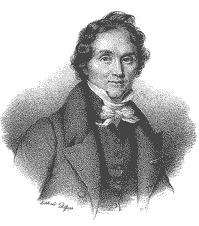Casimir Delavigne facts for kids
Jean-François Casimir Delavigne (born April 4, 1793 – died December 11, 1843) was a famous French poet and writer of plays. He was known for his patriotic poems and successful plays that often reflected the important events of his time.
Contents
Life and Career
Early Life and First Successes
Casimir Delavigne was born in Le Havre, France. He moved to Paris to study at the Lycée Napoleon. He loved to read many books. In 1811, when the empress Marie Louise had a son, Delavigne wrote a poem to celebrate. This poem helped him get a job in the government where he earned money but did not have many duties.
After the Battle of Waterloo in 1815, Delavigne wrote two strong poems. These poems, called Waterloo and Devastation du muse, showed his love for his country. They also included popular political ideas. A third poem was added later. These exciting poems, which he called Messéniennes, became very popular in France. Twenty-five thousand copies were sold, and Delavigne became famous. He was given an honorary job as a librarian, meaning he had no actual work to do.
A New Job and More Plays
In 1819, his play Les Vêpres Siciliennes was performed. It was shown at the Odéon theatre, which had just been rebuilt. This play had been turned down by another theatre before. On the first night, the play was very well received. The manager of the theatre reportedly said, "You have saved us! You are the founder of the second French Theatre."
After this success, Delavigne wrote more plays. These included Comédiens (1820) and Paria (1821). Paria was popular because it openly shared political ideas. These ideas were so strong that the king was not pleased, and Delavigne lost his job. But Louis-Philippe of France, who wanted to be popular with the people, offered Delavigne a new job. He became a librarian at the Palais Royal. He kept this job for the rest of his life.
While working there, he wrote École des vieillards (1823). This play is considered his best comedy. Because of its success, he was chosen to join the Académie française in 1825. During this time, he also wrote La Princesse Aurilie (1828) and Marino Faliero (1829). The latter was a drama written in a romantic style.
Songs of Revolution
Delavigne's success as a writer was greatly helped by the events happening in his country. His Messéniennes poems were inspired by France being occupied by other countries in 1815. Another big moment in his life and in French history was the July Revolution of 1830. This event inspired him to write another famous work, La Parisienne.
This song, with music by Daniel Auber, was sung by almost everyone in France. It became as popular as the Marseillaise. La Parisienne was even the French national anthem during the time of the July Monarchy. He also wrote a similar song, La Varsovienne, for the Poles. They sang it as they marched into battle.
Later Works and Legacy
Other works by Delavigne quickly followed. These included:
- Louis XI (1832)
- Les Enfants d'Édouard (1833)
- Don Juan d'Autriche (1835)
- Une Famille au temps du Luther (1836)
- La Popularité (1838)
- La Fille du Cid (1839)
- Le Conseiller rapporteur (1840)
- Charles VI (1843), an opera partly written by his brother Germain Delavigne
In 1843, Delavigne left Paris to go to Italy. He hoped the change would help his health, which had suffered from all his hard work. But his strength failed him in Lyon, and he died on December 11. His poems and plays were published in 1863. His complete works, published in 1855, include a biography written by his brother, Germain Delavigne. Germain is best known for writing the words for operas.
Many people during Delavigne's time thought he was an amazing writer. Everyone bought and read his works. However, his fame at the time did not last forever. As a writer, he had many good qualities. He wrote in a clear and strong way. He was a poet who used reason more than imagination. He knew his strengths and rarely tried to write about things beyond his abilities. He always wrote what he truly believed.
Adaptations
Some of Delavigne's works were turned into operas:
- Don John of Austria, an opera by Isaac Nathan
- Il Paria (1828), a 2-act opera by Gaetano Donizetti
- Paria, an opera by Stanisław Moniuszko
- Marino Faliero (1835), a 3-act opera by Gaetano Donizetti
See also
 In Spanish: Casimir Delavigne para niños
In Spanish: Casimir Delavigne para niños


